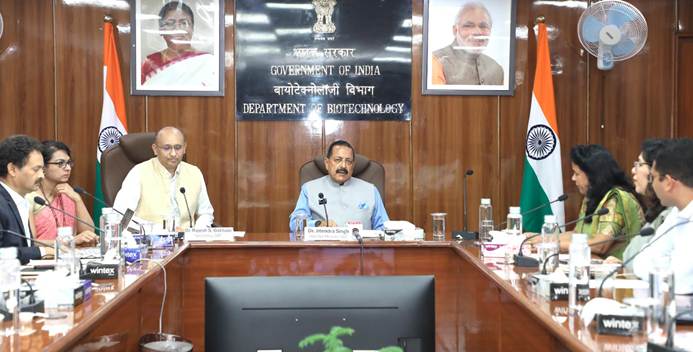Urges citizens to see themselves as stakeholders in Bioeconomy.
NEW DELHI: Union Minister of Science & Technology Dr. Jitendra Singh called for a wider public understanding and inclusive participation in India’s biotechnology mission, stating that every Indian is a stakeholder in the country’s bioeconomy.
Speaking during the nationwide celebration of World Bioproduct Day – The BioE3 Way, the Minister reiterated the government’s commitment to realizing a $300 billion bioeconomy by 2030.
The event, organized by the Department of Biotechnology (DBT) and its agencies BIRAC and iBRIC+, marked a novel national experiment — ‘Voices Across the Cities: A Synchronized National Hourly Dialogue Series’. Over eight hours, select institutions across Indian cities hosted theme-based discussions on marine biomass, industrial valorisation, forest resources, and agri-residue innovations, reflecting the regional diversity of India’s bioproduct capabilities.
Calling the format a “beautiful hybrid model,” Dr. Jitendra Singh praised the decentralized and inclusive outreach. “This is more than a science event. It’s an outreach movement,” he said, adding that involving students, startups and industry leaders was essential to make the mission sustainable. “It is easy to start a startup. What’s difficult is to keep it started,” he said, underlining the need for early industry partnerships and financial support for biotech ventures.
The Minister highlighted that India’s biotechnology ecosystem has grown from just around 50 startups a decade ago to nearly 11,000 today — a leap made possible by policy backing and institutional partnerships. Referring to the recently launched BioE3 Policy, Dr. Jitendra Singh noted that it lays the groundwork for India to lead in sustainable biomanufacturing by aligning bioeconomy goals with environmental sustainability, economic growth, and equity.
“Bioproducts aren’t limited to laboratories anymore. They’re about livelihoods — from biodegradable packaging to eco-friendly personal care, from rural employment to green jobs,” he said. He also emphasized that the future industrial revolution will be driven by bioeconomy, and India, he believes, has taken the lead.
The Minister acknowledged the challenges faced by young scholars in biotech, pointing out the mismatch between parental expectations and individual aptitude in career choices. He termed the National Education Policy (NEP) 2020 a “game-changer” that would allow students to pursue disciplines of interest with flexibility. “We are seeing a new generation with real aptitude and capacity to learn,” he said.
Dr. Jitendra Singh also drew attention to the disparity in India’s past policy priorities, especially in agriculture, which he said was historically informed by western models. Stressing the untapped potential of India’s natural resources and traditional knowledge systems, he said, “Foreign researchers come to India for what they don’t have — our resources and diversity. We should learn to value them first.”


